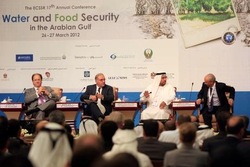The National | 8 May 2012
by Caline Malek
ABU DHABI // Arab states should invest in Central Asian farmland to help to secure their future food supplies, a senior Arab League official said today.
Dr Mohammed Al Twaijri said Central Asia could be a better option than current investments in countries such as Sudan and Egypt, which may become unreliable because of political instability and complex trade laws.
"We should diversify our sources of food and turn towards Asian Islamic countries to invest in their farmland," said Dr Al Twaijri, the league's assistant secretary-general for economic affairs. He was speaking on the sidelines of the second Arab Food Industries Forum, which began today in Abu Dhabi.
"The problem [in some Arab countries] is political obstacles and the lack of appropriate laws," Dr Al Twaijri said.
"If you look at the official index of countries that attract investment, you'll find that agricultural Arab countries are at the bottom of that list. They need clear, simple and effective regulations."
Although the situation had improved in Jordan and Morocco, he said Arab food-importing countries should shift their attention to countries such as Kurdistan and Kazakhstan.
"We should buy land there to produce wheat and any kind of staple food to secure our food resources in the future," Dr Al Twaijri said.
The UAE imports almost 90 per cent of its food at a cost of about Dh11 billion a year, and the Ministry of Foreign Trade has warned that could rise by Dh30bn by 2020.
"Arab states are the weakest in terms of food security because they are all large importers of food," said Dr Hayssam Jaffan, the president of the Arab Federation for Food Industries.
"It is one of the most sensitive areas for food security due to its limited supply of water and land."
Basic food imports in Arab countries were estimated at Dh147bn last year.
And while the population is increasing by 2.2 per cent a year, food production is slowing down.
"Should the current production rates continue this way, we could reach Dh220bn in imports by 2020 and Dh330bn by 2030," said Dr Jaffan.
[email protected]
by Caline Malek
ABU DHABI // Arab states should invest in Central Asian farmland to help to secure their future food supplies, a senior Arab League official said today.
Dr Mohammed Al Twaijri said Central Asia could be a better option than current investments in countries such as Sudan and Egypt, which may become unreliable because of political instability and complex trade laws.
"We should diversify our sources of food and turn towards Asian Islamic countries to invest in their farmland," said Dr Al Twaijri, the league's assistant secretary-general for economic affairs. He was speaking on the sidelines of the second Arab Food Industries Forum, which began today in Abu Dhabi.
"The problem [in some Arab countries] is political obstacles and the lack of appropriate laws," Dr Al Twaijri said.
"If you look at the official index of countries that attract investment, you'll find that agricultural Arab countries are at the bottom of that list. They need clear, simple and effective regulations."
Although the situation had improved in Jordan and Morocco, he said Arab food-importing countries should shift their attention to countries such as Kurdistan and Kazakhstan.
"We should buy land there to produce wheat and any kind of staple food to secure our food resources in the future," Dr Al Twaijri said.
The UAE imports almost 90 per cent of its food at a cost of about Dh11 billion a year, and the Ministry of Foreign Trade has warned that could rise by Dh30bn by 2020.
"Arab states are the weakest in terms of food security because they are all large importers of food," said Dr Hayssam Jaffan, the president of the Arab Federation for Food Industries.
"It is one of the most sensitive areas for food security due to its limited supply of water and land."
Basic food imports in Arab countries were estimated at Dh147bn last year.
And while the population is increasing by 2.2 per cent a year, food production is slowing down.
"Should the current production rates continue this way, we could reach Dh220bn in imports by 2020 and Dh330bn by 2030," said Dr Jaffan.
[email protected]












